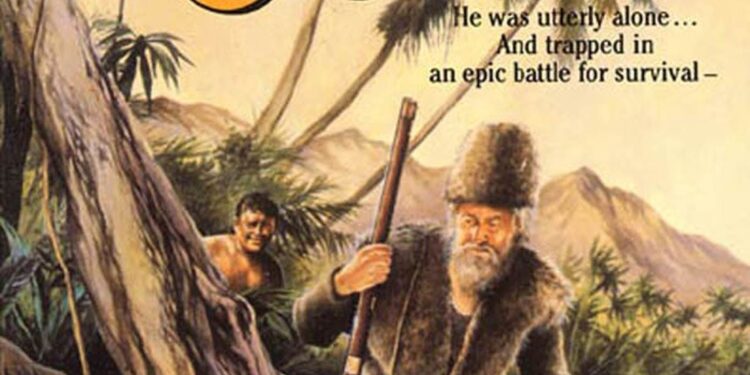Comment on the development of the character of Robinson Crusoe in the story
Daniel Defoe’s timeless classic, Robinson Crusoe, published in 1719, serves as evidence of the timeless value of storytelling and its capacity to enthrall audiences of all ages. Robinson Crusoe, the main character in this gripping story, experiences a dramatic character change as the story progresses. Crusoe’s transformation from an impetuous and reckless young man to a seasoned survivor characterized by self-discovery and resilience is an engrossing examination of the intricacies of human nature.
The Adventurous Youth
The adventure of Robinson Crusoe starts when he makes the snap decision to sail against his father’s wishes and embark on an exciting new life at sea. Throughout the first part of the story, Crusoe exhibits restlessness and a strong desire for independence. His heedless quest of wealth and excitement, combined with his indifference to the repercussions, presents an image of a young man motivated more by impulse than by logic. Crusoe’s initial carelessness and lack of planning paves the way for the revolutionary difficulties he will encounter on the isolated island.
The Desolation and Isolation
The turning point in Robinson Crusoe’s life occurs when he finds himself marooned on a deserted island following a shipwreck. The abrupt shift from a bustling, interconnected society to the solitary confines of the uninhabited island marks a crucial phase in Crusoe’s character development. The stark contrast between his previous life of privilege and the harsh reality of survival in isolation forces Crusoe to confront his own limitations and reevaluate his priorities.
Initially, Crusoe grapples with despair and loneliness, experiencing the depths of isolation that lead to a profound introspection. The absence of human companionship compels him to turn inward, initiating a process of self-discovery and self-reliance. Crusoe’s psychological journey on the island becomes a crucible for the development of his character as he confronts existential questions about his purpose and identity.
Self-Reliance and Resourcefulness
As Crusoe comes to terms with his predicament, he gradually adapts to the challenges of survival. The deserted island becomes both his prison and his workshop, prompting him to develop essential survival skills. Crusoe’s transformation from a naïve adventurer to a resourceful and self-reliant individual is a testament to the resilience of the human spirit in the face of adversity.
Through meticulous descriptions of Crusoe’s various endeavors – building shelter, cultivating crops, and crafting tools – Defoe illustrates the protagonist’s evolution from a privileged, urbanite youth to a practical and industrious survivor. Crusoe’s ingenuity and resourcefulness not only ensure his physical survival but also become symbolic of his newfound mastery over the environment.
Also Read-
- How did Dryden define satire and comment on the central idea of An Essay on Man
- What are the features of a mock-epic and why is The Rape of the Lock known as a mock heroic poem
- Who were the three Johns of the 17th century and what was their contribution to Literature
Religious Awakening
Crusoe’s time on the deserted island is marked by a profound spiritual transformation. Initially dismissive of religious guidance, Crusoe experiences a spiritual awakening as he grapples with the solitude and uncertainty of his situation. The Bible salvaged from the shipwreck becomes his solace, and he turns to prayer and reflection in moments of despair.
A crucial part of Crusoe’s character development is his religious awakening, which gives his actions a deeper moral and ethical dimension. Once a barren island where Crusoe was exiled, the island is transformed into a holy place where he converses with a higher power. His newly discovered faith gives him emotional support and acts as a moral compass, guiding his choices and deeds while he is on the island.
Encounters with Others
The introduction of other characters into Crusoe’s narrative – most notably, Friday – marks another significant phase in his character development. The relationship between Crusoe and Friday becomes a poignant exploration of cultural differences, mutual dependence, and the inherent human need for companionship.
Friday’s arrival challenges Crusoe’s preconceived notions and biases, prompting him to reassess his understanding of humanity. The dynamic between the two characters highlights Crusoe’s capacity for empathy and the gradual dissolution of cultural barriers. Crusoe’s role shifts from being a solitary survivor to a mentor and protector, signifying his evolution from self-centered isolation to a more interconnected and compassionate existence.
Return to Civilization
The culmination of Crusoe’s character development occurs with his eventual return to civilization. The challenges and experiences on the deserted island have transformed him from an impulsive youth into a seasoned individual marked by resilience, self-discovery, and a deeper understanding of life’s complexities.
Upon reintegration into society, Crusoe faces new challenges in reconciling his island experiences with the norms and expectations of civilization. The narrative suggests that while Crusoe may have physically returned to the familiar trappings of society, he carries the indelible mark of his time on the deserted island. The disjunction between his island experiences and the societal norms prompts reflection on the nature of human civilization and the pursuit of a meaningful life.
Conclusion
The character development of Robinson Crusoe in Daniel Defoe’s eponymous novel is a rich tapestry woven with threads of adventure, resilience, self-discovery, and spiritual awakening. From the impulsive youth who embarked on a reckless quest for adventure to the seasoned survivor who emerges from the deserted island, Crusoe’s journey is a compelling exploration of the human spirit’s capacity for adaptation and growth.
The deserted island serves as both a physical and metaphorical landscape for Crusoe’s transformation. It is on this isolated terrain that he confronts the stark realities of survival, grapples with his own identity, and undergoes a profound spiritual awakening. The challenges he faces – from isolation and despair to resourcefulness and self-reliance – contribute to a nuanced portrayal of a character shaped by adversity.
Crusoe’s encounters with other characters, notably Friday, further enrich the narrative, providing insight into the complexities of human relationships and the potential for understanding and empathy across cultural divides. The return to civilization, while a homecoming in the physical sense, introduces new layers of complexity as Crusoe seeks to reconcile his island experiences with societal expectations.
“Robinson Crusoe” endures as a literary classic not only for its adventure and survival themes but also for its exploration of the human condition. Crusoe’s character development resonates with readers across centuries, inviting reflection on themes of resilience, self-discovery, and the intricate interplay between the individual and society. In the end, Crusoe’s journey serves as a timeless reminder of the transformative power of adversity and the enduring quest for meaning in the human experience.















